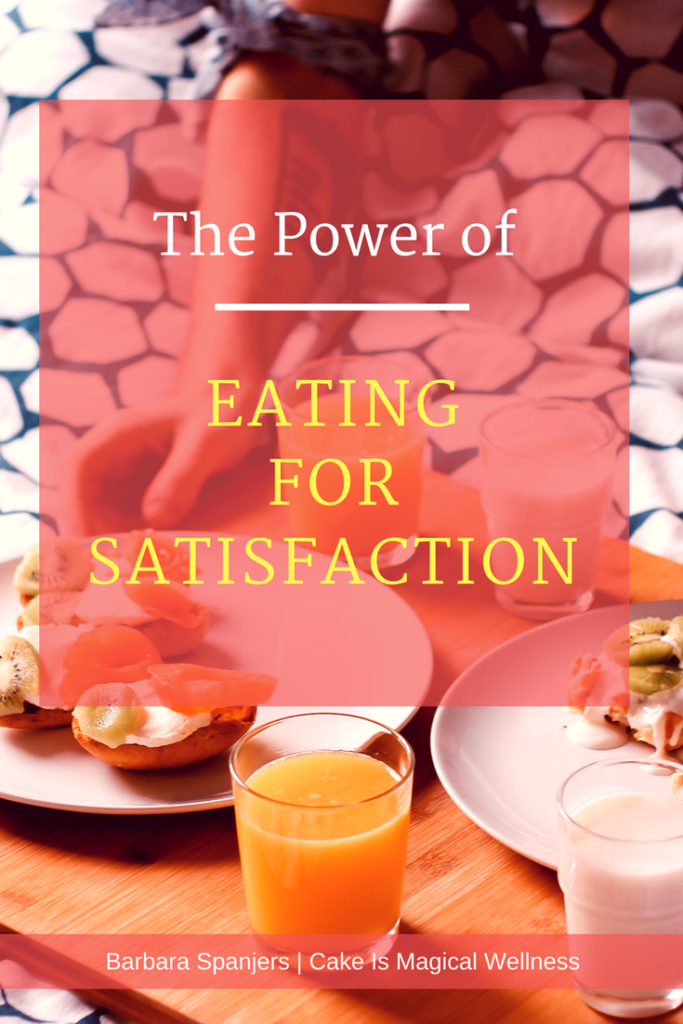
Have you ever eaten salad when you really wanted pizza? Or ate styrofoam rice cakes instead of bread to save some calories? What was your experience after the meal? Did you feel satisfied, or did you end up hitting the Pizza Palace at midnight?
This is the power of eating for satisfaction.
Nutrition advice aside (yes, I know it’s best not to live on French fries alone), eating what you desire can have profound repercussions in repairing your relationship with food. Typically, weight loss plans tell you what to eat, which may or may not match up with what you are hungry for in the moment. This does not bode well for long-term success.
Of course, we don’t always eat the #1 thing that sounds fantastic for every meal. Otherwise, our home kitchens would resemble a restaurant. However, it is crucial that we honor our hunger in ways that are do-able in context. This means that if you are meal planning for vegetable soup because it’s lower-calorie and arguably more nutritious than pasta (naughty, naughty carbs!), you are likely to feel unsatisfied when you eat.
[Tweet “What happens when you feel unsatisfied after a meal – even if your stomach is physically full?”]
What happens when you feel unsatisfied after a meal – even if your stomach is physically full? You will likely keep eating in an attempt to feel satisfied. On top of an already-full stomach, this becomes physically uncomfortable. Not to mention the emotional discomfort of your inner critic trash-talking you.
Benefits of Eating for Satisfaction
- As discussed above, it is not enough to eat just to sate your physical hunger. If you don’t also honor your own desires when it comes to food, you will keep hunting for more, more, more to help feel satisfied, not just full. White-knuckling your way through food choices is practically guaranteed to make you feel tortured, and maybe even binge.
- When you stop vilifying certain foods and let yourself eat them when it suits your fancy, you will no longer feel triggered by their presence. Is it possible to peacefully coexist with Ben and Jerry’s lurking in your freezer? Yes!
- Coupled with mindful eating, eating for satisfaction will help you eat fewer sweets and other trigger foods. Mindful eating helps you really notice and enjoy a meal. You will probably notice that each bite is less pleasurable than the last. Giving yourself permission to eat specific foods, coupled with mindfulness, means that you won’t have to eat the whole portion for maximum pleasure.
- Eating for satisfaction feels great, dammit. There is something about choosing foods that hit the spot that is unparalleled. Recently, my husband made a chicken dish for dinner that I had never had before. It was delicious, sure. But more importantly, it was like a hug. A big, warm, chicken-y hug.
- Food is more than fuel for your body. Eating is a powerful social, cultural, and emotional experience. It is one of life’s great delights. However, if you are excessively engaging in emotional eating, or substituting food for real solutions, then it is time to seek help from a professional.
- When you eat food you enjoy, you absorb more nutrients than when you eat food you don’t enjoy.* (This is my perfect motivation to never eat beets.)
So back to mealtime… Pizza? Or salad? Only you can decide.
- Hallberg, Leif, et al. (1977). Iron absorption from southeast Asian diets. II. Role of various factors that might explain low absorption. American Journal of Clinical Nutrition, 30(4): 539-48






